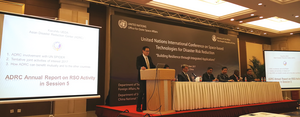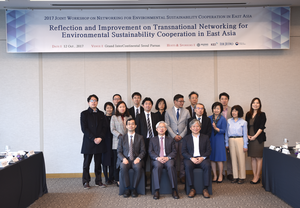The 7th Annual UN-SPIDER Conference, jointly organized by the United Nations Office for Outer Space Affairs (UNOOSA) and the Ministry of Civil Affairs of the People's Republic of China, was held in Beijing on 23-25 October 2017. The event gathered almost 100 participants, including representatives of Space Agencies and Disaster Management Organizations from 34 countries and eight regions, who visited relevant organizations as a part of the three-days' program. ADRC representative attended the meeting from Day 2 afternoon, since the originally planned flight to Beijing on 22th canceled due to Typhoon.
<Afternoon, 24th October >
The theme of session 3 from afternoon on Day 2 was "Technology integrated for disaster risk assessment and emergency response". Each participant reported their activities including Food and Agriculture Organization of the United Nations (FAO), Beijing Normal University, "Continuum Planning and Development Trust, India" a Non-Profit Organization, and Ministry of Home Affairs, India. Amongst all, in the report of FAO, they proposed indicators influencing decision making for food aid by focusing on assessment of situation within seventy-two (72) hours after disaster occurrence, by learning from the cases of "Cyclone Pam" (Vanuatu, March 6, 2015) and "The Great Southern Asia Flood" (Bangladesh, August-September / Sri-Lank May / Nepal, August, 2017).
ADRC joined the session entitled "Integrated emergency response tools/systems" among the parallel session after break. In this session, World Vision International, Department of Civil Protection, Zimbabwe, and National Institute of Aeronautics and Space, Indonesia (Lembaga Penerbangan dan Antariksa Nasional - LAPAN) provided their reports. LAPAN reported about landslides that hit Banjarnegara, Central Java every year and expressed their appreciation for the contribution of Sentinel Asia in the presentation.
<25th October>
On the final day of the conference, plenary session 4 and 5 took place in the morning and site visits in the afternoon.
The session 4 discussed "Integrated applications of earth observation, global navigation satellite system and telecommunication constellations for disaster risk reduction and climate change related extreme hazards" and Newcastle University (England), Beijing University (China), and Delta University (USA) provided their reports.
The report of Newcastle University was about the analysis of landslide by Interferometric SAR in Xinmo village, Mao counter, Ngawa Tibetan and Qiang Autonomous Prefecture, Sichuan Province, China, while Beijing University reported about the analysis of the affected areas by the Kumamoto Earthquakes by using Polarimetric SAR in (ALOS PALSAR PolSAR, April 21, 2016). Both reports emphasized the expectation for further use of Synthetic Aperture Radar (SAR) satellite for emergency response, enabling assessment of affected situation easier.
The Session 5 explored "Networking and engagement with the UN-SPIDER network". Mr. Ueda, researcher, ADRC reported as the final presenter in this session that ADRC has been playing the role of Regional Support Office (RSO) of UN-SPIDER through the initiative of Sentinel Asia and the escalation to international charter. ADRC stressed also that voluntary activities facilitating disaster risk reduction need to be further promoted by referring to the recent participation in Sentinel Asia by Mohammed Bin Rashid Space Centre (MBRSC), and the satellite images provision of the Jiuzhaigou Earthquake in August through Sentinel Asia.
In the afternoon, participants were divided into two groups, one visited the National Disaster Reduction Center of China, and another, China Academy of Space Technology (CAST) Exhibition Center. ADRC representative joined the former.
<26th October>
ADRC visited the Institute of Geology, China Earthquake Administration (CEA) to make an interview about Emergency Observation Request (EOR) for Jiuzhaigou Earthquake in August this year.
The primary purpose of this EOR was to predict secondary damages in order to support the relief activities after the earthquake. According to the CEA, the Sichuan mountain area including Jiuzhaigou is frequently hit by earthquakes in China, and observation by using satellite is thus indispensable. Data observed by SAR satellite has been widely used since optical satellite could not be used on cloudy days, which is frequent in the region
Besides, ADRC requested them not only to make observation requests but also to analyze satellite imagery in the future since CEA is registered as Data Analysis Node (DAN).
(2017/10/24 19:30)



